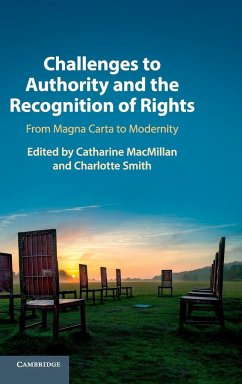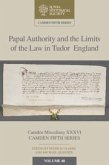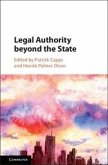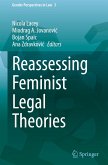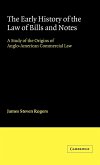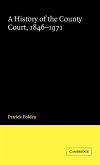Challenges to Authority and the Recognition of Rights
Herausgeber: MacMillan, Catharine; Smith, Charlotte
Challenges to Authority and the Recognition of Rights
Herausgeber: MacMillan, Catharine; Smith, Charlotte
- Gebundenes Buch
- Merkliste
- Auf die Merkliste
- Bewerten Bewerten
- Teilen
- Produkt teilen
- Produkterinnerung
- Produkterinnerung
A unique volume demonstrating how law changes by reason of challenges to authority which seek the recognition of rights.
Andere Kunden interessierten sich auch für
![Papal Authority and the Limits of the Law in Tudor England Papal Authority and the Limits of the Law in Tudor England]() Papal Authority and the Limits of the Law in Tudor England111,99 €
Papal Authority and the Limits of the Law in Tudor England111,99 €![Legal Authority Beyond the State Legal Authority Beyond the State]() Legal Authority Beyond the State137,99 €
Legal Authority Beyond the State137,99 €![The Workplace Constitution from the New Deal to the New Right The Workplace Constitution from the New Deal to the New Right]() Sophia Z. LeeThe Workplace Constitution from the New Deal to the New Right87,99 €
Sophia Z. LeeThe Workplace Constitution from the New Deal to the New Right87,99 €![Reassessing Feminist Legal Theories Reassessing Feminist Legal Theories]() Reassessing Feminist Legal Theories127,99 €
Reassessing Feminist Legal Theories127,99 €![Health and Safety in Contemporary Britain Health and Safety in Contemporary Britain]() Paul AlmondHealth and Safety in Contemporary Britain52,99 €
Paul AlmondHealth and Safety in Contemporary Britain52,99 €![The Early History of the Law of Bills and Notes The Early History of the Law of Bills and Notes]() James Steven RogersThe Early History of the Law of Bills and Notes118,99 €
James Steven RogersThe Early History of the Law of Bills and Notes118,99 €![A History of the County Court, 1846 1971 A History of the County Court, 1846 1971]() Patrick PoldenA History of the County Court, 1846 1971214,99 €
Patrick PoldenA History of the County Court, 1846 1971214,99 €-
-
-
A unique volume demonstrating how law changes by reason of challenges to authority which seek the recognition of rights.
Hinweis: Dieser Artikel kann nur an eine deutsche Lieferadresse ausgeliefert werden.
Hinweis: Dieser Artikel kann nur an eine deutsche Lieferadresse ausgeliefert werden.
Produktdetails
- Produktdetails
- Verlag: Cambridge University Press
- Seitenzahl: 362
- Erscheinungstermin: 16. August 2018
- Englisch
- Abmessung: 235mm x 157mm x 26mm
- Gewicht: 738g
- ISBN-13: 9781108429238
- ISBN-10: 1108429238
- Artikelnr.: 50555505
- Herstellerkennzeichnung
- Libri GmbH
- Europaallee 1
- 36244 Bad Hersfeld
- gpsr@libri.de
- Verlag: Cambridge University Press
- Seitenzahl: 362
- Erscheinungstermin: 16. August 2018
- Englisch
- Abmessung: 235mm x 157mm x 26mm
- Gewicht: 738g
- ISBN-13: 9781108429238
- ISBN-10: 1108429238
- Artikelnr.: 50555505
- Herstellerkennzeichnung
- Libri GmbH
- Europaallee 1
- 36244 Bad Hersfeld
- gpsr@libri.de
Introduction Catharine MacMillan; Part I. Magna Carta, Challenges to
Authority and the Recognition of Rights in England: 1. Magna Carta: the
emergence of the myth John Baker; 2. Benefit of clergy and the authority of
Magna Carta Margaret McGlynn; 3. How to get rid of a king: lawyering the
Revolution of 1399 David Seipp; 4. Magna Carta and the fragmented
authorities of the later Middle Ages Anthony Musson; 5. Revolution
principles and the revolution bench Mike Macnair; Part II. Broader
Challenges to Authority and the Recognition of Rights in England: 6. Magna
Carta Clauses 4 and 5 and the problem of account Joshua Getzler; 7. Some
effects of war on the law in late eighteenth and early nineteenth-century
England James Oldham; 8. Tax, freedom and social expectations: fiscal
impact on the built environment in nineteenth-century England Chantal
Stebbings; Part III. Magna Carta, Challenges to Authority and the
Recognition (and Rejection) of Rights beyond England: 9. The Magna Carta in
the German discourse about English constitutional law between the
eighteenth and the early twentieth century Andreas Thier; 10. A Magna Carta
for the world? The constitutional protection of foreign subjects in the age
of revolution Daniel Hulsebosch; 11. 'The state of slavery': the slave,
grace, and the rise of pro-slavery constitutionalism in the
nineteenth-century Atlantic world Patricia Hagler Minter; 12. The Royal
Proclamation of 1763: an indigenous Magna Carta's rough ride in British
Columbia Hamar Foster; 13. 'Law: challenges to authority and the
recognition of rights': examples from British India Raymond Cocks; 14.
'Unfortunate necessities of warfare?': Australia's national security
regulations and the right to free speech during World War I Diane Kirkby.
Authority and the Recognition of Rights in England: 1. Magna Carta: the
emergence of the myth John Baker; 2. Benefit of clergy and the authority of
Magna Carta Margaret McGlynn; 3. How to get rid of a king: lawyering the
Revolution of 1399 David Seipp; 4. Magna Carta and the fragmented
authorities of the later Middle Ages Anthony Musson; 5. Revolution
principles and the revolution bench Mike Macnair; Part II. Broader
Challenges to Authority and the Recognition of Rights in England: 6. Magna
Carta Clauses 4 and 5 and the problem of account Joshua Getzler; 7. Some
effects of war on the law in late eighteenth and early nineteenth-century
England James Oldham; 8. Tax, freedom and social expectations: fiscal
impact on the built environment in nineteenth-century England Chantal
Stebbings; Part III. Magna Carta, Challenges to Authority and the
Recognition (and Rejection) of Rights beyond England: 9. The Magna Carta in
the German discourse about English constitutional law between the
eighteenth and the early twentieth century Andreas Thier; 10. A Magna Carta
for the world? The constitutional protection of foreign subjects in the age
of revolution Daniel Hulsebosch; 11. 'The state of slavery': the slave,
grace, and the rise of pro-slavery constitutionalism in the
nineteenth-century Atlantic world Patricia Hagler Minter; 12. The Royal
Proclamation of 1763: an indigenous Magna Carta's rough ride in British
Columbia Hamar Foster; 13. 'Law: challenges to authority and the
recognition of rights': examples from British India Raymond Cocks; 14.
'Unfortunate necessities of warfare?': Australia's national security
regulations and the right to free speech during World War I Diane Kirkby.
Introduction Catharine MacMillan; Part I. Magna Carta, Challenges to
Authority and the Recognition of Rights in England: 1. Magna Carta: the
emergence of the myth John Baker; 2. Benefit of clergy and the authority of
Magna Carta Margaret McGlynn; 3. How to get rid of a king: lawyering the
Revolution of 1399 David Seipp; 4. Magna Carta and the fragmented
authorities of the later Middle Ages Anthony Musson; 5. Revolution
principles and the revolution bench Mike Macnair; Part II. Broader
Challenges to Authority and the Recognition of Rights in England: 6. Magna
Carta Clauses 4 and 5 and the problem of account Joshua Getzler; 7. Some
effects of war on the law in late eighteenth and early nineteenth-century
England James Oldham; 8. Tax, freedom and social expectations: fiscal
impact on the built environment in nineteenth-century England Chantal
Stebbings; Part III. Magna Carta, Challenges to Authority and the
Recognition (and Rejection) of Rights beyond England: 9. The Magna Carta in
the German discourse about English constitutional law between the
eighteenth and the early twentieth century Andreas Thier; 10. A Magna Carta
for the world? The constitutional protection of foreign subjects in the age
of revolution Daniel Hulsebosch; 11. 'The state of slavery': the slave,
grace, and the rise of pro-slavery constitutionalism in the
nineteenth-century Atlantic world Patricia Hagler Minter; 12. The Royal
Proclamation of 1763: an indigenous Magna Carta's rough ride in British
Columbia Hamar Foster; 13. 'Law: challenges to authority and the
recognition of rights': examples from British India Raymond Cocks; 14.
'Unfortunate necessities of warfare?': Australia's national security
regulations and the right to free speech during World War I Diane Kirkby.
Authority and the Recognition of Rights in England: 1. Magna Carta: the
emergence of the myth John Baker; 2. Benefit of clergy and the authority of
Magna Carta Margaret McGlynn; 3. How to get rid of a king: lawyering the
Revolution of 1399 David Seipp; 4. Magna Carta and the fragmented
authorities of the later Middle Ages Anthony Musson; 5. Revolution
principles and the revolution bench Mike Macnair; Part II. Broader
Challenges to Authority and the Recognition of Rights in England: 6. Magna
Carta Clauses 4 and 5 and the problem of account Joshua Getzler; 7. Some
effects of war on the law in late eighteenth and early nineteenth-century
England James Oldham; 8. Tax, freedom and social expectations: fiscal
impact on the built environment in nineteenth-century England Chantal
Stebbings; Part III. Magna Carta, Challenges to Authority and the
Recognition (and Rejection) of Rights beyond England: 9. The Magna Carta in
the German discourse about English constitutional law between the
eighteenth and the early twentieth century Andreas Thier; 10. A Magna Carta
for the world? The constitutional protection of foreign subjects in the age
of revolution Daniel Hulsebosch; 11. 'The state of slavery': the slave,
grace, and the rise of pro-slavery constitutionalism in the
nineteenth-century Atlantic world Patricia Hagler Minter; 12. The Royal
Proclamation of 1763: an indigenous Magna Carta's rough ride in British
Columbia Hamar Foster; 13. 'Law: challenges to authority and the
recognition of rights': examples from British India Raymond Cocks; 14.
'Unfortunate necessities of warfare?': Australia's national security
regulations and the right to free speech during World War I Diane Kirkby.

